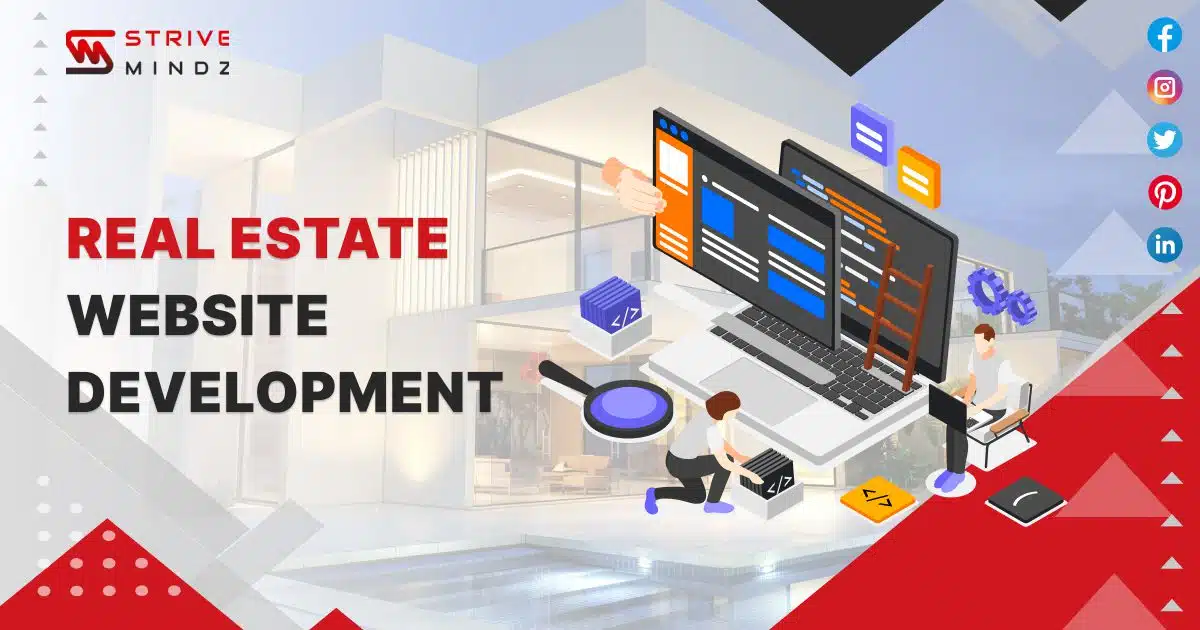Real Estate Website Development Guide: Everything You Need To Know

If you are a real estate business owner who does not have a website yet, then let us ask you this question: how do you establish business communication with your clients? How do you advertise what you have to offer and how do you manage your entire business offline? If we had to guess, we would suggest that you have a brick-and-mortar office space from where you handle all your operations. We would guess that you advertise your business through offline advertisements – posters billboards and whatnot! And we will definitely guess that you either communicate with your clients via mail and phone calls, or you prefer in-person communication.
But these are all quite expensive and time-consuming methods, and as effective as they may be, it is impossible to grow your audience exponentially through this offline approach. Having an online website for your real estate business in the present-day scenario is just more convenient and helpful in growing your business. If you are curious, then let us guide you through all the necessary information that you need on real estate websites and their development process.
What Are Real Estate Websites And Why Should You Have One?
A real estate website can simply be regarded as a digital office space for your real estate business. The real estate website acts as a bridge between property sellers and property buyers. On these websites, property owners can list their property for sale or rent and the property buyers can search for different properties in different locations and purchase or rent according to their wish.
The real estate business is a lucrative one, and you might already know that. It is one of the most sustainable sectors which has strong growth potential. While the money factor is one of the biggest reasons why should you own a real estate website, there are more reasons which are given below –
- Wide range of target audience
- Promotion and establishment of communication
- Ease of operations
- Time efficient
Wide range of target audience
As a realtor, you need to be able to communicate with as many people as possible to close deals and start making money. With an online website, you can reach a wide range of audience and you can advertise your business to gain new customers in a quicker and more efficient way. With the help of keywords and search engine optimization, different users can also find your brand quite easily online – which is not possible through offline advertisements.
Promotion and establishment of communication
Realtors need to be always in contact with potential clients and promote their services in order to secure sales and other orders. A website helps greatly in spreading awareness about your business among property sellers and buyers. It helps establish easy and constant communication with your clients which is key in the real estate business.
Ease of operations
Working on your website is just far more convenient and easy compared to working offline. On top of this, having your own website helps you update all the new information and details regarding any property sale or rent in any specific area. It is now much easier to get new leads and publish them on your website.
Time efficient
For a realtor, the sooner a deal closes, the better. This is why, you should always opt for a website as working on your own website saves a lot of time compared to working offline. Your clients can contact you easily through your website, get all the necessary details, and even do all the paperwork much quicker through your official website.
Types Of Real Estate Websites
A real estate business deals with several types of clients – some are looking to sell a house while some are looking to buy one. Some clients want to rent a property while some have an investment perspective in mind. To cater to the needs of these different clients and to address all the use cases, real estate websites can be classified into four types –
- Real estate marketplaces or property listing websites
- Property management websites
- Real estate aggregator websites
- Real estate investment websites
a) Real estate marketplaces or property listing websites
The real estate marketplace is probably the most common type of real estate website. It is where property owners can list their properties for sale or for rent, and property buyers can select a property to buy or to rent from these listed options. The potential buyers can get all the information and descriptions on different properties from these websites such as property pictures, building plans, total area, location and so on.
b) Property management websites
Property management websites help homeowners to manage their property in just a few clicks. It helps property owners to manage everything from buying a property to selling to renting one. These services are cost-effective and mostly apply to residential or commercial properties.
c) Real estate aggregator websites
Real estate aggregator websites act as a guide for property buyers where they can find all the necessary details from different real estate websites. These websites can be described as a cesspool of data, and they help both property buyers and investors to find their desired property through just one search.
d) Real estate investment websites
Real estate websites serve two purposes – firstly, they provide investors with a space where they can invest in different real estate assets, and secondly, they offer several guides, articles and blogs that help real estate investors identify the best investment option depending on their investment criteria.
Steps of Real Estate Website Development: A Comprehensive Guide
In today’s digital landscape, a well-developed real estate website acts as a cornerstone for any agent or agency. It serves as a 24/7 online storefront, showcasing properties, attracting potential clients, and fostering brand recognition. Understanding the intricacies of real estate web development empowers you to create a website that converts visitors into leads and drives business growth.
This guide will equip you with a step-by-step approach, outlining the crucial phases involved in building a compelling real estate website.
Step 1: Understanding the Scope of the Project
Before embarking on the development journey, it’s crucial to clearly define your project goals and objectives. What do you aim to achieve with your website? Is it lead generation, brand awareness, or establishing yourself as a local expert?
Furthermore, conducting thorough market research and understanding your target audience are essential. Who are you trying to reach? What are their needs and expectations from a real estate website? By gaining these insights, you can tailor your website’s features and functionality to resonate with your ideal audience.
Step 2: Planning Phase
A meticulously planned project lays the foundation for a successful website. This phase involves conducting a thorough requirement analysis, identifying all the functionalities your website needs to possess. This could include property listings, search filters, contact forms, and integration with external tools.
Additionally, creating a realistic project timeline and budget estimation is crucial for managing expectations and ensuring smooth execution.
Step 3: Design Phase
The design phase breathes life into your website’s vision. Choosing a suitable design approach like responsive design ensures your website adapts seamlessly across different devices.
Developing wireframes and prototypes allows you to visualize the website’s layout and user flow. These can be presented to clients for feedback and refinement before proceeding with the development stage.
Step 4: Development Phase
The development phase involves transforming the design into a functional website. Selecting the right technology stack, which includes a Content Management System (CMS) and relevant frameworks, forms the backbone of your website.
This phase also involves developing and integrating essential features. Core functionalities might include property listings, advanced search filters, user accounts, and contact forms.
Step 5: Testing and Quality Assurance
Rigorous testing is paramount to ensure your website functions flawlessly across various devices and browsers. This includes performing functionality testing to verify each feature works as intended and ensuring compliance with web accessibility standards for an inclusive user experience.
Step 6: Deployment and Launch
Once the website is thoroughly tested and refined, it’s time to launch. Choosing a reliable web hosting provider ensures your website remains accessible to visitors and offers optimal performance.
Furthermore, implementing Search Engine Optimization (SEO) best practices enhances your website’s visibility in search engine results, attracting organic traffic from potential clients.
Step 7: Post-Launch Maintenance
The journey doesn’t end with the launch. Ongoing maintenance and support services are crucial to ensure your website remains secure, up-to-date, and continues to deliver a positive user experience.
Regularly monitoring website performance and user feedback allows you to identify areas for improvement and keep your website competitive in the ever-evolving digital landscape.
By following these comprehensive steps, you can navigate the real estate web development process with confidence, creating a website that effectively showcases your properties, connects with potential clients, and drives business growth in the competitive real estate landscape. Remember, a user-friendly and functional website is an invaluable asset, fostering trust and establishing you as a reliable and trustworthy resource in the real estate industry.
Read more: Benefits of Outsourcing Software Development
Important Features To Add To Your Real Estate Website
Handling a website is all about serving your customers right, and the best way to serve your customers is to provide them with useful tools that help ease the process of buying or selling a property. Include the following features or tools in your real estate website to make it stand out from the rest.
- User sign in & authentication
- Database
- Search Filters
- Map
- Video or virtual tours
- Favorites
- Messaging
- Calendar for booking appointments
- Calculator
User sign-in and authentication
Different users visit real estate websites with different needs. To give everyone a personalised experience, it is important to add the sign in feature where they can fill out all the necessary details about their identity and their needs. On top of that, having a real estate website means you have to keep your users safe and secure and keep your website trustworthy. User verification and authentication help in keeping your website safe.
Database
The main purpose of a real estate website is to provide agents and potential buyers with a list of all the listed properties throughout the region they operate in. To keep your list up to date and complete, you have to link all the listing databases of that specific region with your website.
Search Filters
The live search filters help users to search for the exact type of property they are looking for. Users need to be able to use search filters such as property location, number of rooms, price, available facilities, transport access and so on. These filters help potential buyers to find their dream property much more quickly and save time for everyone.
Map
The location of the listed properties can be a concern for users. This is why your real estate website must provide users with a map option to view where the property is located, and what facilities they have in that area. Most websites use Google Maps for the map feature.
Video or virtual tours
All the real estate websites allow homeowners to post pictures of their properties to attract clients. You can take this a bit far and add a virtual tour feature where homeowners can give potential buyers a tour of the home completely virtually. Seeing is believing, and people tend to trust videos more than simple pictures.
Favorites
The favorites section acts similarly to the “wish list” feature that you get to see on different e-commerce websites. As we said, by linking the listing databases with your website, you can showcase multiple properties to your users. The favourites section helps them separate a few properties which they have identified as their best choices. This also helps in narrowing down choices which makes choosing a property easier for the users.
Messaging
Communication is the key to closing the deals. Add a messaging feature on your website which will help users to come in contact with realtors or property sellers and through discussion they can finalize the details of the deal. With the messaging feature, users can get all the necessary information about the property in no time and this saves a lot of trouble on both ends.
Calendar for booking appointments
No matter how many photos and videos you show, users can only feel confident in purchasing a property after they have seen it in person. With the calendar feature, realtors and homeowners can provide users with the available dates for a tour of the property and users can select a date from the list as per their convenience.
Calculator
This is a simple feature that can help users identify the potential price of assets depending on multiple factors, such as the locality, number of rooms, facilities, and so on.
Technological Requirements to Develop a Real Estate Website
The following technology is used while developing a real estate website –
- Big data for collecting all information, analyzing them and storing them,
- AI and machine learning for personalized browsing experience,
- Virtual and Augmented Reality (VR / AR) for virtual tours of properties,
- Internet of Things (IoT) for cloud facilities, features, and sending and receiving information.
How To Monetise Your Real Estate Website?
Once you launch your real estate website, you need to start making money off of it. So how do you use your website to generate revenues? Here are the two things that you can do –
-
Listing fees
For real estate marketplaces, listing fees can be a good source of income. In this revenue model, whenever homeowners list a property on your website, you can charge a percentage of their amount as a listing fee. This is a straightforward and sustainable source of revenue for real estate websites.
-
Paid advertisements
Once your website is renowned, you can choose to show paid advertisements on your website and generate revenue. However, remember that too many ads will be extremely frustrating for your users and your website can lose popularity because of that.
How Much Does a Real Estate Website Cost in 2024?
The cost of developing a real estate website can vary significantly depending on several factors, making it difficult to provide a single definitive answer. However, here’s a breakdown to help you estimate the potential cost:
Factors impacting cost:
- Size and complexity: Smaller websites with basic features (1-10 pages) generally range from $1,000 to $5,000. More complex websites with numerous features and functionalities (50+ pages) can cost upwards of $15,000.
- Development approach: Building a website from scratch using custom code is typically more expensive than using website builders or pre-made templates.
- Features and integrations: Integrating advanced features like MLS feeds, virtual tours, or CRM systems can increase the cost.
- Designer and developer expertise: Hiring experienced professionals generally comes at a higher cost compared to freelancers or less established agencies.
Estimated cost ranges:
- Basic website: $1,000 – $5,000
- Medium-sized website: $5,000 – $15,000
- Advanced or custom website: $15,000 and above
Additional costs to consider:
- Domain name and web hosting: Typically a recurring annual expense.
- Content creation: Writing compelling property descriptions and other website content.
- Ongoing maintenance and updates: Regular website maintenance and security updates.
Overall, the cost of developing a real estate website can vary widely depending on your specific requirements and the options you choose. It’s important to carefully consider your budget and needs when planning your real estate website development project.
To sum it up
Building and maintaining your real estate website is a lucrative business in today’s market. With the help of Strivemindz, build a strong website for your brand and attract your customers with ease. Strivemindz holds the necessary skills and experience in the field to build a Real Estate website that allows you to connect with your clients and grow your business. Contact us and let us start your real estate website development project ASAP!


